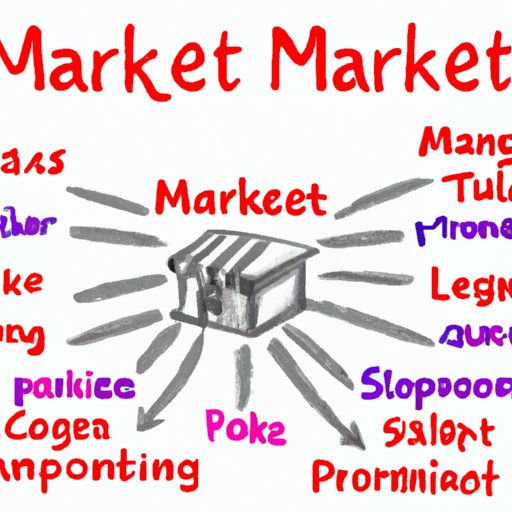Introduction
A marketplace is an online platform that connects buyers and sellers from around the world. It enables buyers to browse and purchase products from multiple vendors all in one place, while providing sellers with an easy way to reach a wider audience and increase their sales. In this article, we’ll explore how a marketplace works and the benefits and challenges associated with it.
Explaining the Basics of a Marketplace: How It Works and Who’s Involved
At its core, a marketplace is an online platform that facilitates transactions between buyers and sellers. The structure of a marketplace consists of two main components: the platform itself and the participants. Here, we’ll take a look at both.
Structure of a Marketplace
The structure of a marketplace can vary depending on the type of platform being used. Generally speaking, a marketplace will have a searchable directory of products or services, as well as a payment processing system for completing transactions. Other features may include product reviews, ratings, and customer support.
Types of Marketplace Platforms
There are several different types of marketplace platforms available. Some of the most popular include ecommerce marketplaces, mobile marketplaces, peer-to-peer marketplaces, and subscription-based marketplaces. Each type of platform has its own unique advantages and disadvantages, so it’s important to do your research before deciding which one is right for you.
Participants in a Marketplace
The participants in a marketplace are the buyers and sellers. Buyers are individuals or businesses who purchase products or services from the marketplace. Sellers are the vendors who list their products or services on the marketplace and fulfill orders. In some cases, the marketplace may also act as a middleman, taking a percentage of the sale price as a commission.
Benefits of Shopping in a Marketplace
Shopping in a marketplace has numerous benefits for buyers. Here, we’ll take a look at some of the most notable ones.
Wide Variety of Products
One of the biggest advantages of shopping in a marketplace is the wide variety of products and services that are available. With so many different vendors offering their wares, buyers have access to a much broader selection than they would if they were shopping at a physical store or on a single website.
Convenience
Another benefit of shopping in a marketplace is convenience. Buyers can easily compare prices, read customer reviews, and make purchases without ever having to leave the comfort of their home. This makes it easier and more enjoyable to shop.
Competitive Prices
The competitive nature of the marketplace ensures that buyers get the best deals possible. With so many vendors vying for customers, prices tend to be lower than what you would find at a physical store or on a single website.
Reliability and Security
Most marketplaces have stringent security measures in place to protect buyers’ data and information. Additionally, most marketplaces have a dispute resolution process in place to ensure buyers get the products or services they paid for.

Process of Selling in a Marketplace
For sellers, setting up a store in a marketplace is relatively straightforward. Here, we’ll take a look at the steps involved in getting started.
Setting Up Your Store
The first step in setting up your store is to create an account with the marketplace. This entails providing basic information about yourself and your business. You’ll then need to select a pricing plan and configure any other settings you want to use.
Listing Your Products
Once your store is set up, you’ll need to start listing your products. This involves providing detailed information about each item, including photos, descriptions, and pricing. Make sure to include accurate and up-to-date information to ensure that buyers know exactly what they’re getting.
Managing Your Inventory
It’s important to keep track of your inventory to ensure that you always have enough stock to meet customer demand. Most marketplaces provide tools to help you manage your inventory, such as automatic re-ordering and low-stock notifications.
Processing Orders and Shipping
Once you receive an order, you’ll need to process it and ship it out to the customer. Most marketplaces provide integrated shipping solutions to streamline this process. Depending on the size and scope of your business, you may also want to consider using a fulfillment service to help with order fulfillment.
Handling Returns
Finally, you’ll need to be prepared to handle returns and exchanges. Most marketplaces have policies in place to protect buyers, so make sure you understand these policies before selling on the platform.

Advantages of Buying from a Marketplace
In addition to having access to a wide variety of products and services, buyers also benefit from the additional protections offered by marketplaces. Here, we’ll take a look at some of the advantages of buying from a marketplace.
Quality Control
Most marketplaces have stringent quality control measures in place to ensure that buyers get only the highest quality products. This means that buyers can rest assured that they’re getting exactly what they paid for.
Transparency
Many marketplaces also offer transparency, meaning that buyers can see what other customers think of the products they’re considering purchasing. This helps buyers make informed decisions and avoid scams.
Customer Support
Finally, many marketplaces offer customer support to help buyers with any questions or issues they may have. This makes it easier for buyers to get the help they need when they need it.

Challenges of Operating a Marketplace
Operating a marketplace can be challenging, especially for new sellers. Here, we’ll take a look at some of the common challenges associated with running a marketplace.
High Competition
The marketplace is a highly competitive environment, so it can be difficult for new sellers to stand out. To succeed, sellers must be able to differentiate themselves from their competitors.
Low Margins
Many marketplaces charge commissions on sales, which can eat into sellers’ profits. As such, it’s important for sellers to be mindful of their margins and adjust their pricing accordingly.
Regulatory Compliance
Finally, it’s important for sellers to remain compliant with local laws and regulations. This can be a challenge, as laws vary from country to country and can change over time.
Popular Marketplaces & Examples of Successful Companies
There are numerous popular marketplaces available today. Here, we’ll take a look at some of the most popular ones and provide examples of successful companies that use them.
Amazon
Amazon is one of the largest and most popular marketplaces in the world. It offers a wide range of products and services, from books and electronics to apparel and home goods. Notable companies that use Amazon include Apple, Nike, and Panasonic.
eBay
eBay is another popular marketplace, with millions of buyers and sellers worldwide. It specializes in used and vintage items, but also offers new products. Notable companies that use eBay include Sony, Microsoft, and Samsung.
Etsy
Etsy is a marketplace that focuses on handmade and vintage items. It’s popular among artisans, crafters, and small business owners. Notable companies that use Etsy include Kate Spade, Anthropologie, and Urban Outfitters.
Alibaba
Alibaba is a Chinese marketplace that offers a wide variety of products and services. It’s popular among international buyers and sellers, and many large companies use it to source products. Notable companies that use Alibaba include Walmart, Home Depot, and Target.
Conclusion
In conclusion, a marketplace is an online platform that facilitates transactions between buyers and sellers. It offers numerous benefits for both buyers and sellers, such as a wide variety of products, convenience, competitive prices, and reliability and security. However, operating a marketplace can be challenging due to high competition, low margins, and regulatory compliance. Popular marketplaces include Amazon, eBay, Etsy, and Alibaba, and there are many successful companies that use them.
(Note: Is this article not meeting your expectations? Do you have knowledge or insights to share? Unlock new opportunities and expand your reach by joining our authors team. Click Registration to join us and share your expertise with our readers.)
